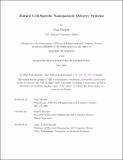| dc.contributor.advisor | Barzilay, Regina | |
| dc.contributor.author | Murphy, Sean | |
| dc.date.accessioned | 2024-08-21T18:55:38Z | |
| dc.date.available | 2024-08-21T18:55:38Z | |
| dc.date.issued | 2024-05 | |
| dc.date.submitted | 2024-07-10T12:59:47.191Z | |
| dc.identifier.uri | https://hdl.handle.net/1721.1/156308 | |
| dc.description.abstract | The targetable delivery of therapeutic nanoparticles remains a significant challenge in modern medicine, particularly due to the complexity, time, and expense involved in experimental design and optimization for cell-specific applications. To address this, NOCAP (Nanoparticle Optimization and Cell Affinity Prediction) was developed, a computational framework designed to (i) predict the affinities between nanoparticles and gene expression signatures of cancer cells and (ii) optimize nanoparticle formulations for specific targets. NOCAP successfully predicts cellular affinity for previously unseen cancer cell lines. The findings demonstrate the potential of machine learning to streamline the rational selection of target-specific nanoparticle drug delivery systems, paving the way for more efficient and precise therapeutic interventions. | |
| dc.publisher | Massachusetts Institute of Technology | |
| dc.rights | Attribution-NonCommercial-NoDerivatives 4.0 International (CC BY-NC-ND 4.0) | |
| dc.rights | Copyright retained by author(s) | |
| dc.rights.uri | https://creativecommons.org/licenses/by-nc-nd/4.0/ | |
| dc.title | Toward Cell-Specific Nanoparticle Delivery Systems | |
| dc.type | Thesis | |
| dc.description.degree | S.M. | |
| dc.contributor.department | Massachusetts Institute of Technology. Department of Electrical Engineering and Computer Science | |
| mit.thesis.degree | Master | |
| thesis.degree.name | Master of Science in Electrical Engineering and Computer Science | |
